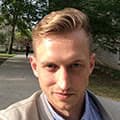Tell us a little about your background.
Originally from Germany, I'm a graduate student in the doctoral program in the Department of Sociology at Indiana University. Ever since I entered university I have been interested in measuring culture with quantitative methods. To that end, I think Data Science gives us the tools, but Sociology provides us with the theory to understand culture.
What was your experience with data science before you started your education with DataCamp?
I learned a few things about web scraping and the basics of text mining, but I quickly realized that this field is much larger than I imagined. Also, I was mostly working with R, but had no exposure to Python; it is great to be able to learn both in the same place.
What drew you to data science? Why is learning data science important to you?
It's an exciting time to be alive, because there is more data available than ever before. There is more data than we could ever analyze, much less understand. In that context, data science is our means of taming unstructured information and gathering insight. I'm a cultural sociologist and learning data science is important to me because people upload tons of text that may tell us about their worldviews and their values, if only we know how to analyze it.
What do you like about DataCamp?
As someone who doesn't come from a coding background, DataCamp is geared toward my needs because you cannot advance in a course unless you code. In other MOOC's, you can sometimes get away with just watching the videos. I noticed that I will cheat myself into believing that I understood the content without having written any code.
Also, I like DataCamp courses for their mix of videos, multiple choice questions and coding exercises. After most courses, I feel like I understood the background as much as the applied part of an algorithm.
Can you give us some examples of how you've used skills you've learned from DataCamp?
I'm currently working on several projects involving Twitter data and data from the New York Times API. I basically used my DataCamp skills the whole way—from gathering the data, to restructuring it from JSON to a pandas DataFrame, to analyzing it.
What were the challenges or pain points that prompted you to look for a solution like DataCamp?
I wanted to learn R and Python. Most of Sociology revolves around STATA, which is fine for analyzing survey data, but for textual data I needed to get my hands on other tools.
How does DataCamp compare to other online learning platforms you've tried?
The courses are excellent and they meet a higher standard than other platforms. Also, I really like that DataCamp forces you to code in order to advance in the course.
What is the greatest benefit of learning with DataCamp?
Coding, coding, coding—with a little bit of guidance.
What advice do you have for someone just starting out with DataCamp?
Take your time and try to get as much out of the courses as you can. It is easy to rush through a course, but much harder to actually understand the content in detail. Also, the end of the course is just the beginning of data science.
